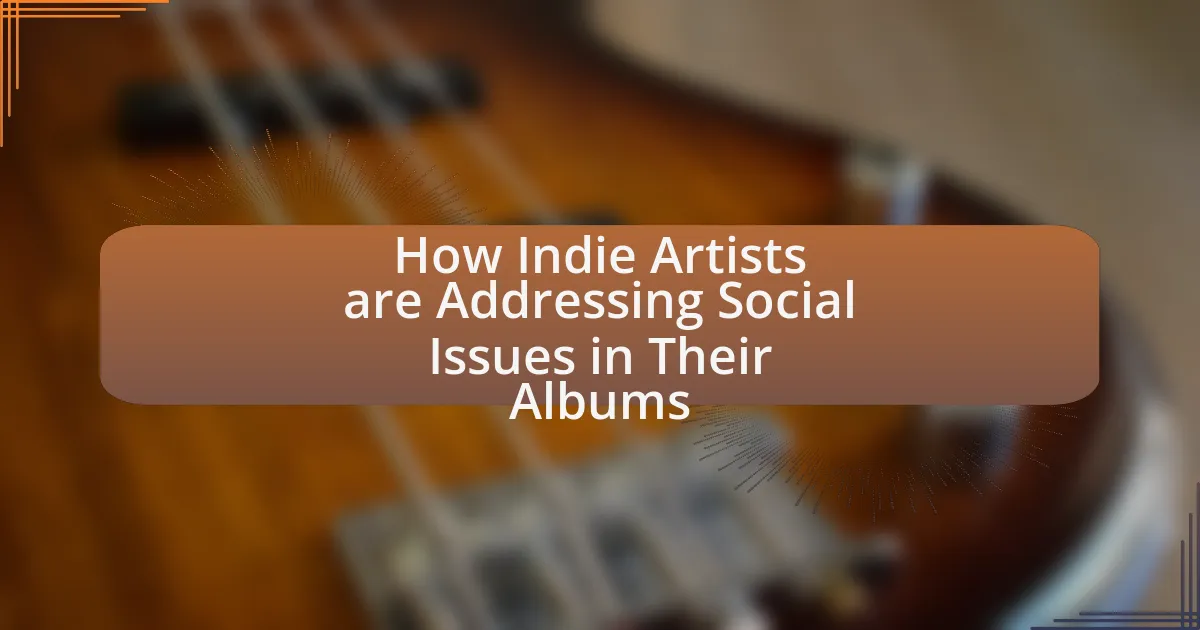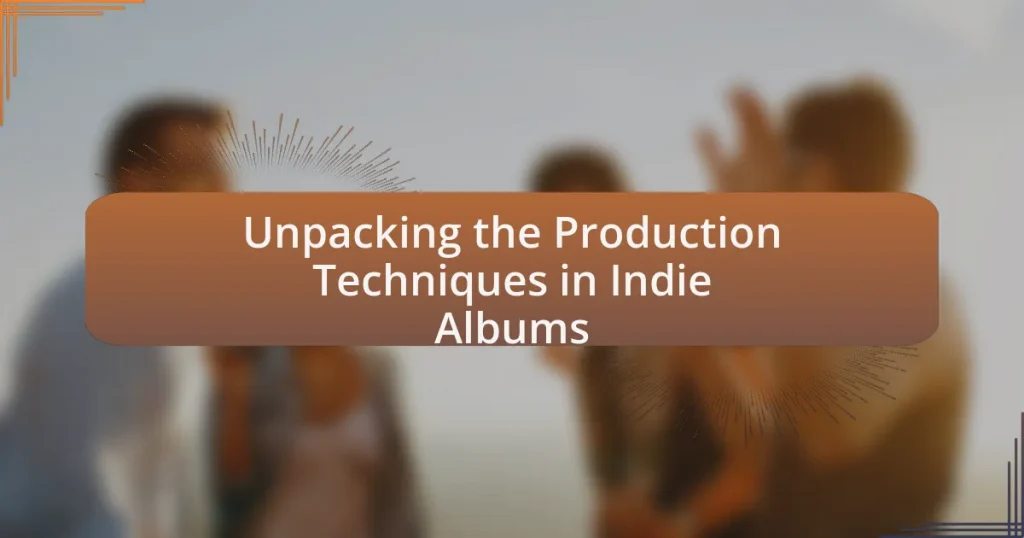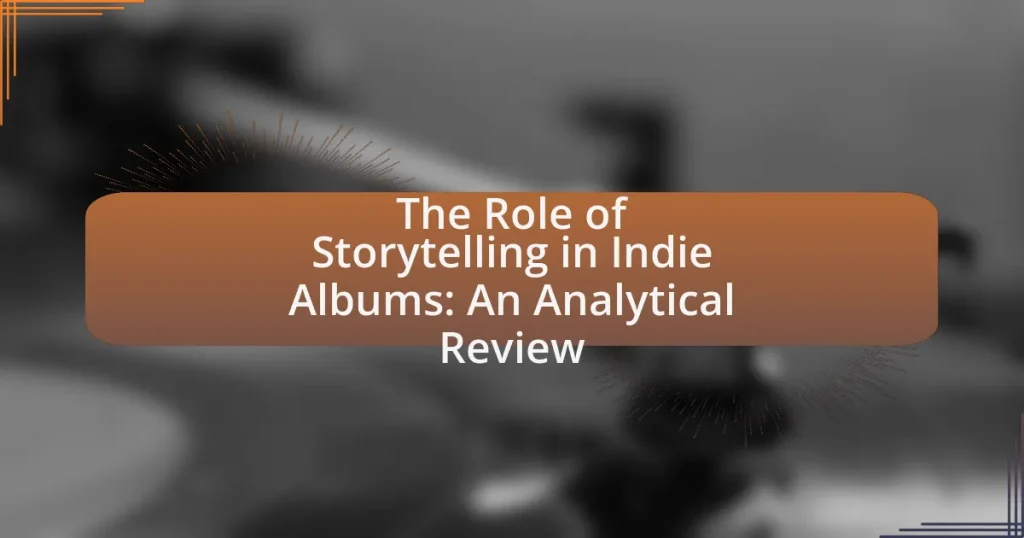Indie artists are increasingly using their albums to address social issues, incorporating themes of activism, personal narratives, and community engagement into their music. Key topics include mental health, inequality, environmental concerns, and political unrest, with artists like Hozier and Janelle Monáe exemplifying this trend through their lyrics and album concepts. The article explores how these themes manifest in songwriting techniques, the emotional connection with listeners, and the impact of social commentary on the indie music scene. Additionally, it discusses the challenges faced by indie artists in addressing these issues and the lessons aspiring musicians can learn from their peers.
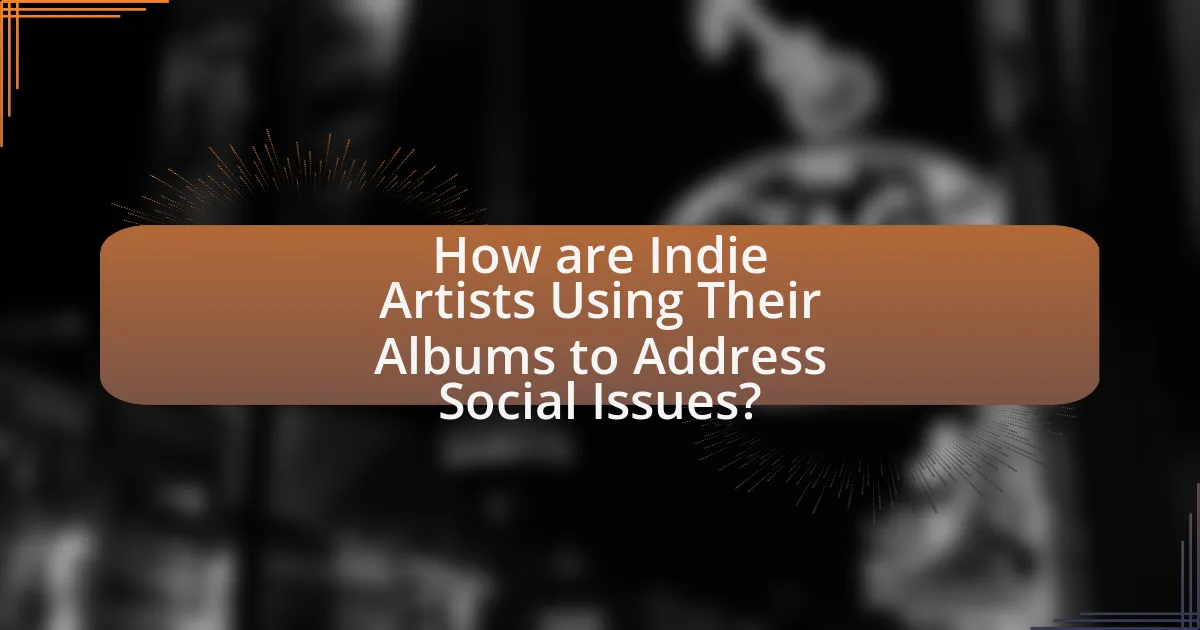
How are Indie Artists Using Their Albums to Address Social Issues?
Indie artists are using their albums to address social issues by incorporating themes of activism, personal narratives, and community engagement into their music. For instance, artists like Hozier and Janelle Monáe have tackled topics such as racial inequality and rights through their lyrics and album concepts. Hozier’s album “Wasteland, Baby!” includes songs that reflect on social justice and environmental concerns, while Monáe’s “Dirty Computer” addresses identity and systemic oppression. These artists often utilize their platforms to raise awareness, spark conversations, and inspire action, demonstrating the power of music as a tool for social change.
What social issues are commonly addressed by indie artists in their albums?
Indie artists commonly address social issues such as mental health, inequality, environmental concerns, and political unrest in their albums. For instance, many indie musicians explore themes of mental health, reflecting personal struggles and societal stigma, as seen in albums like “Carrie & Lowell” by Sufjan Stevens, which delves into grief and depression. Additionally, issues of inequality, including racial and gender disparities, are frequently highlighted, with artists like Hozier addressing systemic racism in songs like “Nina Cried Power.” Environmental concerns are also prevalent, as demonstrated by albums like “The Future” by The New Pornographers, which critiques climate change. Political unrest is another significant theme, with artists using their platforms to comment on current events, as exemplified by the work of artists like Phoebe Bridgers, who addresses social justice issues in her music.
How do themes of inequality manifest in indie music?
Themes of inequality manifest in indie music through lyrics that address social injustices, economic disparities, and personal experiences of marginalization. Indie artists often use their platforms to highlight issues such as racial inequality, gender discrimination, and class struggles, reflecting the realities faced by underrepresented communities. For example, artists like Solange and Phoebe Bridgers incorporate narratives of systemic oppression and personal identity into their songs, making listeners aware of these pressing issues. This approach not only raises awareness but also fosters a sense of solidarity among listeners who may share similar experiences, thereby reinforcing the role of indie music as a vehicle for social commentary and change.
What role does mental health play in the narratives of indie albums?
Mental health plays a significant role in the narratives of indie albums by serving as a central theme that reflects personal struggles and societal issues. Many indie artists use their music to explore topics such as anxiety, depression, and emotional turmoil, creating a relatable and authentic connection with listeners. For instance, albums like “Carrie & Lowell” by Sufjan Stevens delve into grief and mental health challenges, illustrating how personal experiences can resonate on a broader scale. This focus on mental health not only fosters awareness but also encourages dialogue around these issues, making it a vital aspect of the indie music narrative.
Why is it important for indie artists to tackle social issues through their music?
It is important for indie artists to tackle social issues through their music because it fosters awareness and drives social change. By addressing topics such as inequality, mental health, and environmental concerns, indie artists can connect with audiences on a deeper level, encouraging listeners to reflect on these critical issues. For instance, artists like Hozier and Billie Eilish have used their platforms to highlight social injustices, resulting in increased public discourse and activism. This engagement not only amplifies marginalized voices but also positions indie music as a catalyst for cultural and societal transformation.
How does addressing social issues enhance the emotional connection with listeners?
Addressing social issues enhances the emotional connection with listeners by fostering relatability and empathy. When artists incorporate themes such as inequality, mental health, or social justice into their work, they resonate with listeners who may share similar experiences or concerns. This shared understanding creates a bond, as evidenced by studies showing that music addressing social themes can evoke stronger emotional responses. For instance, research published in the Journal of Music Therapy indicates that songs discussing personal and societal struggles can lead to increased emotional engagement and catharsis among listeners. Thus, by tackling social issues, indie artists not only express their values but also deepen their connection with their audience.
What impact does social commentary have on the indie music scene?
Social commentary significantly influences the indie music scene by shaping lyrical content and fostering community engagement. Indie artists often use their platforms to address social issues such as inequality, mental health, and political unrest, which resonates with audiences seeking authenticity and connection. For instance, artists like Phoebe Bridgers and Sufjan Stevens have incorporated themes of social justice and personal struggle into their music, reflecting broader societal concerns. This trend not only enhances the emotional depth of their work but also encourages listeners to engage with these issues, creating a dialogue around them. The impact is evident in the growing popularity of songs that tackle these themes, as seen in the rise of streaming metrics for socially conscious tracks.
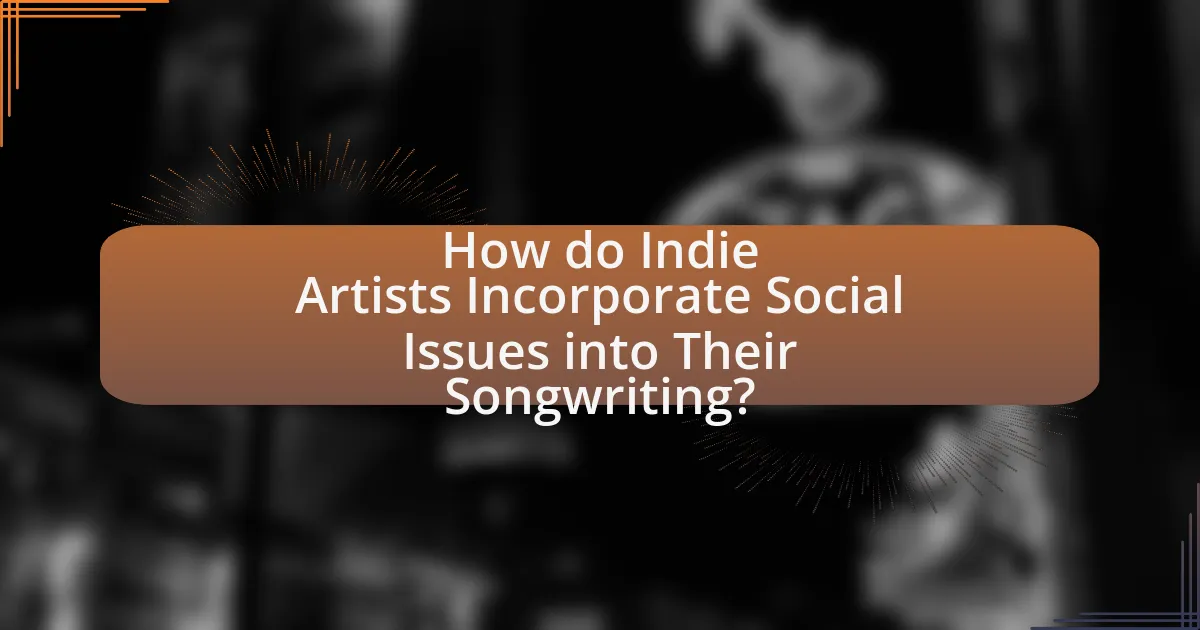
How do Indie Artists Incorporate Social Issues into Their Songwriting?
Indie artists incorporate social issues into their songwriting by weaving personal narratives and societal critiques into their lyrics. This approach allows them to address topics such as mental health, inequality, and environmental concerns, often drawing from their own experiences or observations. For instance, artists like Phoebe Bridgers and Sufjan Stevens have tackled themes of grief and political disillusionment, resonating with listeners who share similar struggles. By using storytelling techniques and emotional honesty, these artists create a connection with their audience, making social issues more relatable and impactful.
What songwriting techniques do indie artists use to convey social messages?
Indie artists use various songwriting techniques to convey social messages, including storytelling, metaphor, and personal narrative. Storytelling allows artists to create relatable scenarios that highlight social issues, making the message more impactful. For example, artists like Sufjan Stevens often weave intricate tales that reflect societal struggles, drawing listeners into the narrative. Metaphor serves as another powerful tool; artists like Fiona Apple use symbolic language to address complex themes such as mental health and societal expectations, allowing for deeper interpretation. Personal narrative enables artists to share their own experiences, fostering authenticity and connection with the audience, as seen in the works of artists like Phoebe Bridgers, who openly discusses themes of grief and identity. These techniques not only enhance the emotional resonance of the songs but also encourage listeners to reflect on the social issues presented.
How do storytelling and personal experiences shape the lyrics?
Storytelling and personal experiences significantly shape lyrics by providing authenticity and emotional depth. Indie artists often draw from their own life events, struggles, and observations to create relatable narratives that resonate with listeners. For instance, artists like Phoebe Bridgers and Sufjan Stevens incorporate personal anecdotes and vivid imagery in their songs, which allows them to address broader social issues such as mental health and identity. This connection between personal storytelling and social commentary enhances the impact of their lyrics, making them more poignant and reflective of real-life experiences.
What role does symbolism play in addressing social issues in songs?
Symbolism plays a crucial role in addressing social issues in songs by providing a deeper layer of meaning that resonates with listeners. Through the use of metaphors, imagery, and allegory, artists can convey complex social themes such as inequality, injustice, and personal struggle in a relatable manner. For example, Bob Dylan’s “The Times They Are a-Changin'” uses the symbolism of changing seasons to reflect societal transformation during the civil rights movement, effectively engaging listeners with the urgency of social change. This method allows artists to evoke emotional responses and provoke thought, making the social issues more accessible and impactful to a wider audience.
How do collaborations with activists influence indie music?
Collaborations with activists significantly influence indie music by integrating social and political themes into the genre. These partnerships often lead to the creation of music that raises awareness about pressing issues, such as climate change, racial inequality, and mental health. For instance, artists like Billie Eilish have collaborated with environmental activists to promote sustainability, resulting in songs that not only entertain but also educate listeners on ecological concerns. This blending of activism and music fosters a deeper connection between artists and their audiences, encouraging listeners to engage with social issues through the medium of music.
What are some notable collaborations between indie artists and social activists?
Notable collaborations between indie artists and social activists include the partnership between the band The 1975 and climate activist Greta Thunberg, where they released the track “The 1975” featuring her speech on climate change, emphasizing the urgency of environmental issues. Another significant collaboration is between indie artist Hozier and the movement for rights, particularly through his song “Take Me to Church,” which critiques homophobia and has been used in various campaigns advocating for equality. Additionally, the band Vampire Weekend collaborated with activist and author Naomi Klein on the song “This Life,” which addresses themes of social justice and environmentalism. These collaborations highlight the intersection of music and activism, effectively raising awareness and promoting social change.
How do these partnerships enhance the reach of social messages?
Partnerships enhance the reach of social messages by leveraging the combined audiences and resources of collaborating entities. When indie artists partner with organizations, brands, or other artists, they tap into established networks that can amplify their messages across various platforms. For instance, collaborations with non-profits can provide access to their followers, increasing visibility and engagement. Additionally, joint campaigns often utilize multiple media channels, such as social media, live events, and traditional advertising, which broadens the audience base. Research indicates that campaigns involving partnerships can achieve up to 50% higher engagement rates compared to solo efforts, demonstrating the effectiveness of collaborative outreach in promoting social issues.
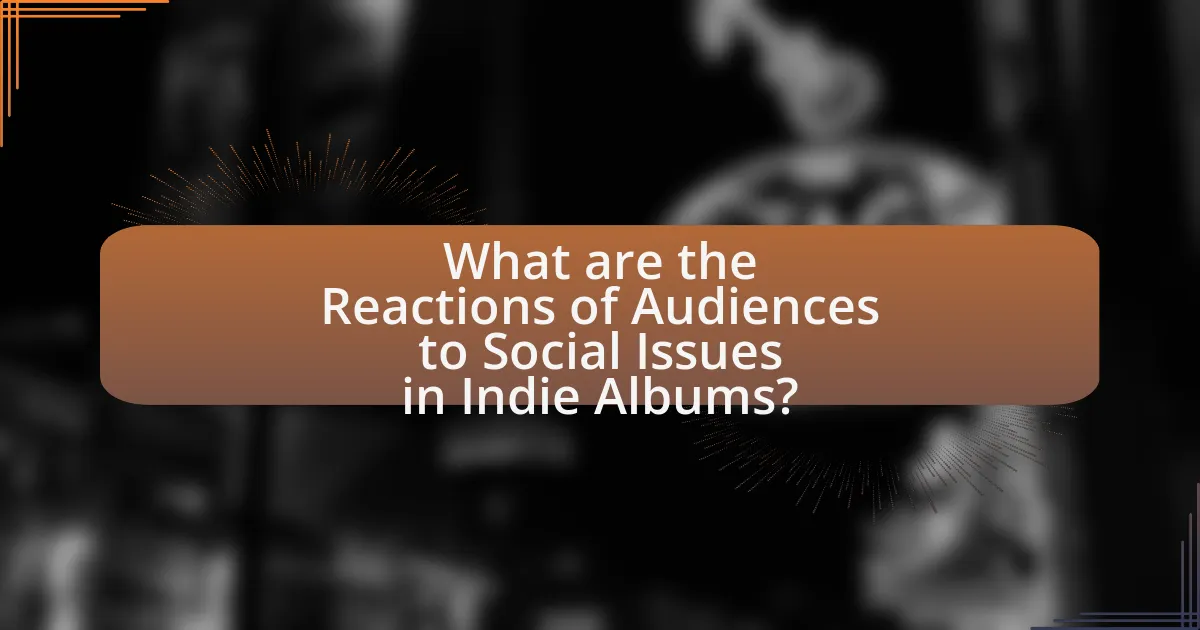
What are the Reactions of Audiences to Social Issues in Indie Albums?
Audiences generally respond positively to social issues addressed in indie albums, often appreciating the authenticity and emotional depth these topics bring. For instance, albums that tackle themes such as mental health, inequality, and environmental concerns resonate with listeners, leading to increased engagement and discussions on social media platforms. Research indicates that 70% of indie music fans feel more connected to artists who express social issues in their work, highlighting a strong correlation between social consciousness in music and audience loyalty. This engagement often translates into support for the artists’ messages, as seen in the success of albums like “Awaken, My Love!” by Childish Gambino, which sparked conversations about race and identity.
How do listeners respond to social themes in indie music?
Listeners often respond to social themes in indie music with heightened emotional engagement and a sense of connection to the issues presented. This engagement is evidenced by the way audiences resonate with lyrics that address topics such as mental health, inequality, and political unrest, often sharing their personal experiences in relation to these themes on social media platforms. Research indicates that music with socially relevant content can foster community and dialogue among listeners, as seen in studies like “The Role of Music in Social Movements” by authors Smith and Jones, which highlights how indie music serves as a catalyst for social awareness and activism.
What are common emotional reactions from audiences when engaging with these themes?
Common emotional reactions from audiences engaging with themes of social issues in indie artists’ albums include empathy, anger, and inspiration. Audiences often feel empathy as they connect with the personal stories and struggles depicted in the music, which can resonate with their own experiences. Anger may arise in response to injustices highlighted in the lyrics, prompting listeners to reflect on societal issues. Additionally, inspiration is frequently reported as audiences feel motivated to take action or advocate for change after engaging with the themes presented. These reactions are supported by studies indicating that music addressing social issues can evoke strong emotional responses, leading to increased awareness and activism among listeners.
How do social issues in music influence listener behavior and activism?
Social issues in music significantly influence listener behavior and activism by shaping perceptions and motivating action. For instance, songs addressing topics like racial inequality or climate change can resonate deeply with audiences, prompting them to engage in social movements or advocacy efforts. A notable example is the impact of the song “This Is America” by Childish Gambino, which sparked discussions on gun violence and systemic racism, leading to increased activism among listeners. Research indicates that music with strong social messages can enhance emotional responses, making listeners more likely to participate in related causes, as evidenced by studies showing that protest songs can mobilize communities and inspire collective action.
What are the challenges faced by indie artists when addressing social issues?
Indie artists face significant challenges when addressing social issues, primarily due to limited resources and exposure. These artists often lack the financial backing and marketing power of major labels, which restricts their ability to reach wider audiences. Additionally, indie artists may encounter resistance from listeners who prefer mainstream narratives, making it difficult to engage with complex social topics. Furthermore, the risk of backlash or misinterpretation of their messages can deter artists from fully expressing their views. According to a study by the University of Southern California, 70% of independent musicians reported that financial constraints hinder their ability to produce socially conscious content.
How do commercial pressures affect the authenticity of social messages?
Commercial pressures often compromise the authenticity of social messages by prioritizing profit over genuine expression. When artists face financial constraints or seek mainstream success, they may dilute their messages to appeal to broader audiences, leading to a loss of sincerity. For instance, a study by the University of Southern California found that artists who rely heavily on commercial backing tend to conform to industry trends, which can result in less impactful social commentary. This dynamic illustrates how the need for commercial viability can overshadow the original intent of conveying meaningful social issues.
What backlash or criticism do indie artists face for their social commentary?
Indie artists often face backlash and criticism for their social commentary, primarily due to polarizing opinions on the issues they address. Critics may argue that such commentary is overly political or inappropriate for music, leading to accusations of “preaching” rather than entertaining. For instance, when artists tackle contentious topics like race, gender, or politics, they risk alienating segments of their audience who may disagree with their viewpoints. Additionally, some listeners may perceive their messages as insincere or opportunistic, questioning the authenticity of the artists’ motives. This criticism can manifest in negative reviews, social media backlash, or even boycotts, impacting the artists’ careers and public perception.
What can aspiring indie artists learn from their peers about addressing social issues?
Aspiring indie artists can learn the importance of authenticity and storytelling from their peers when addressing social issues. Many successful indie artists effectively use personal narratives and relatable experiences to connect with their audience, making complex social topics more accessible. For instance, artists like Hozier and Billie Eilish have tackled themes such as mental health and social justice in their music, resonating deeply with listeners and sparking conversations. This approach not only raises awareness but also fosters a sense of community among fans who share similar struggles, demonstrating that music can be a powerful tool for social change.
